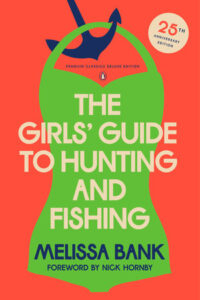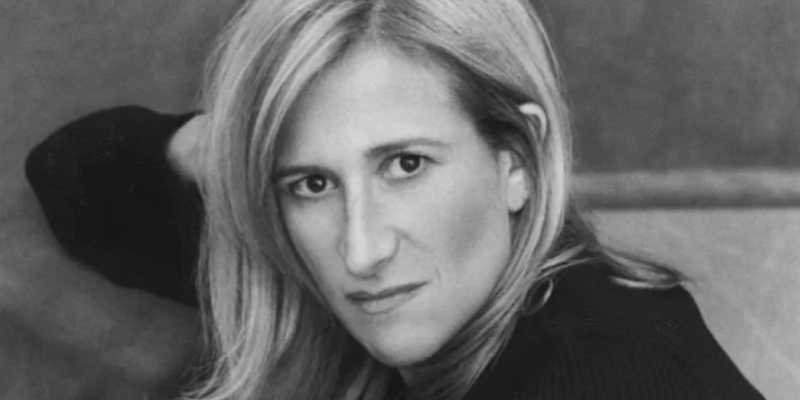Appreciating the Understated Complexity of The Girls’ Guide to Hunting and Fishing
Nick Hornby Remembers His Friend and Fellow Author, Melissa Bank
I met Melissa Bank in the late twentieth century, in between the publication of her two books—the one you are holding (let’s pretend that it is the late twentieth century, and you have no choice but to hold a book in order to read it) and The Wonder Spot. I can’t remember how or why we met, but for a while we hung out whenever I was in New York or she was in London. I loved spending time with her. She wanted to talk, and to listen, and to laugh as loudly and as frequently as possible. But she was acutely observant, shrewd, endlessly sympathetic and, above all, loving. It seemed to me that she met people hoping she could love them.
And she was fearless. I had already read The Girls’ Guide to Hunting and Fishing when we met—so, like everyone else, I was a fan. When I was putting together Speaking with the Angel, an anthology of short stories with contributions from Irvine Welsh and Dave Eggers and Zadie Smith and a whole bunch of other people, Melissa was someone whose work I very much wanted to include. She gave me The Wonder Spot, the story not the book, and she came to London when Speaking with the Angel was launched. The launch party was an enormous event in the Hammersmith Palais, the much-loved gig venue, now gone, that The Clash sang about. Teenage Fanclub played, and well-known actors read a couple of stories to an excitable crowd. It was a tough gig even for the actors—experienced, professional showoffs—and only one of the authors wanted to read her own work to the noisy spectators: Melissa, the one who had only recently published her debut book. Everyone in that audience, many of whom had had more than one drink, listened to every word. She was a knockout.
Reading interviews with Melissa now, all these years later, it’s interesting and a little depressing to see how often she seemed to be required to defend herself. The introduction to one of them includes the line, “Certainly the pages turn without too much difficulty, however,” as if this is somehow beside the point of reading, before the (male) interviewer asks the author whether she thinks “chick-lit” is a demeaning term.
Longevity is the only indicator of literature that really matters, and this book is built to last.Let me help you out, Mr. Interviewer. Yes, it’s a demeaning term: it usually means, “People are buying and reading and loving this book, and they are not buying and reading and loving mine. So they are cheating in some way.” People who write about books used to worry a lot about whether a book was Literature or not back then, weirdly. They worried especially if the book had jokes in it. The vast majority of readers didn’t and still don’t think about that at all. Melissa’s retort, which was a good one, was this: “For me, a lot of the work comes in refining it. Even if I’m saying something that I think of as having real depth or substance, I don’t want to say it in a way that bogs a reader down. I’m after something else.” In other words, what often gets talked about as Literature is simply a couple of drafts short of being something that people can consume with any pleasure. Melissa’s way of creating literature was to write simple, plain sentences, in many different colors, and lay them next to each other until they formed a beautiful mosaic, and this mosaic was placed over a bed of melancholy which you are only dimly aware of when first the story and then the book are over. There’s the complexity. There’s the art, and the depth.
The Girls’ Guide to Hunting and Fishing is about two decades in the life of a young woman, Jane Rosenal. This, of course, is asking for trouble—or at least, asking for a snooty critic to dismiss it in patronizing terms while admitting at the same time that it’s entertaining and funny. But Jane Rosenal is dealing with growing up (she’s a teenager in the first story), loneliness, a career that she may or may not be suitable for, inappropriate and unsatisfying sexual relationships, mortally ill parents, doubt, confusion. She’s dealing with the stuff of life, in other words, the only life an ordinary young woman—or man—in a big city knows, and she thinks about it, and despairs over it, and makes jokes about it. (This book is full of terrific one-liners, all of which deserve the compliment of being left where they belong, in the body of the book, so that you can enjoy them as they were meant to be enjoyed.)
When Melissa died, I posted a picture on Instagram of her, and me, and our friend the writer Sarah Vowell. I want to quote a couple of the comments that people posted underneath. The first, from a publisher, said “Girls’ Guide to Hunting and Fishing changed my relationship to reading forever. I still think about it all the time.” The other, from a writer, said “The Wonder Spot is one of my all- time favorite novels. I keep [it] by my desk for inspiration and re-read it every year.” You could find similar sentiments all over the internet. Both of her beautiful books, I was happy and sad to see, meant a great deal to a whole generation of writers. I doubt that she understood that when she was alive, and she wouldn’t have believed it anyway. She wasn’t the type.
I miss her, of course. Everyone who knew her misses her. But you will miss her, too, if you are about to read this book for the first time. You will wish that there were ten or fifteen other books to catch up on; you will be sorry that we can’t read about one of her characters coming to grips with cell phones, dating apps, gender identity, bitter political division, or any of the other twenty-first-century material that Melissa would have written about so well. The Girls’ Guide to Hunting and Fishing is nearly a quarter of a century old, and people go on discovering it, reading it, laughing at the jokes, and being moved by it, just as they do with I Capture the Castle, or the novels of Muriel Spark, or True Grit. Longevity is the only indicator of literature that really matters, and this book is built to last.
__________________________________

The Girls’ Guide to Hunting and Fishing: 25th-Anniversary Edition by Melissa Bank, forward by Nick Hornby, is available from Penguin Classics, an imprint of Penguin Publishing Group, a division of Penguin Random House, LLC.




















